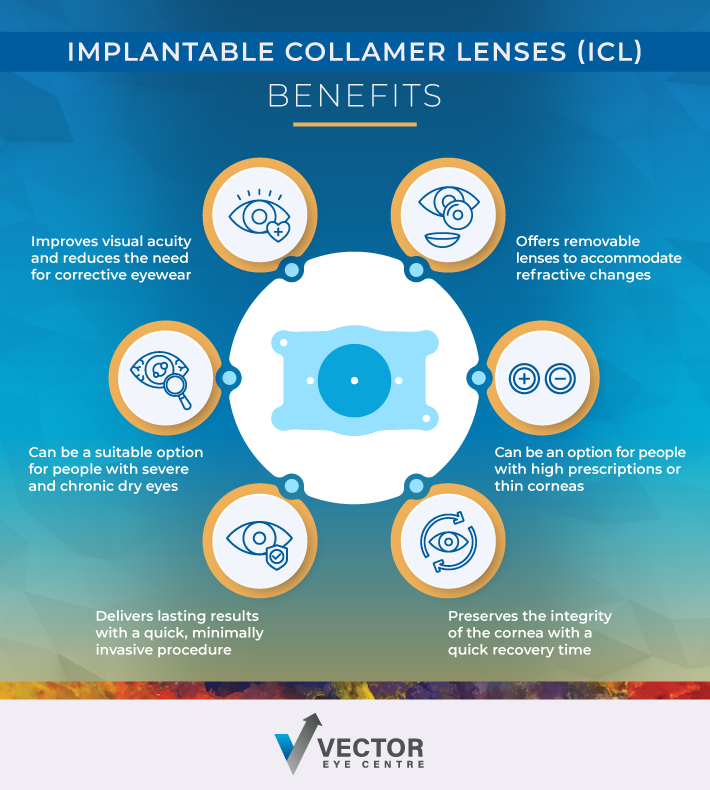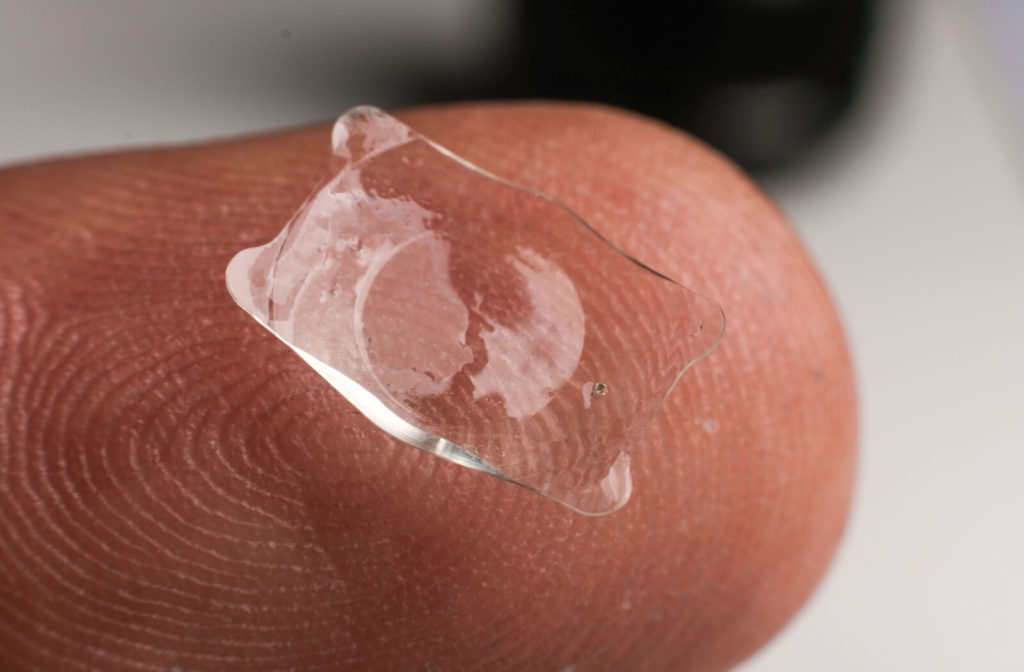Refractive surgeries help correct refractive errors like myopia, hyperopia, and astigmatism.
Unlike laser-based procedures, Implantable Collamer Lens (ICL) surgery preserves the natural structure of the eye, improving vision clarity while reducing the risk of dry eyes. Additionally, because the procedure is minimally invasive, the recovery time is usually quick. ICL refractive surgery may be more suitable for people with thin corneas or who may not be good candidates for LASIK or PRK or SMILE..

What Is Implantable Collamer Lens (ICL) Surgery?
Implantable Collamer Lenses (ICL) are implants placed between the iris and the natural lens to help correct refractive problems such as nearsightedness, farsightedness, and astigmatism.
Unlike laser eye surgery, such as LASIK and PRK, ICL provides permanent yet removable lenses to correct vision without altering the cornea’s structure. Unlike refractive lens exchange (RLE), which replaces your eye’s natural lens, ICL preserves your natural lens.
What Are the Benefits of ICL?
ICL shares several benefits with other refractive eye surgeries, including:
- Improved visual acuity
- Less dependence on corrective eyewear
- Quick procedure and lasting results
However, ICL also provides additional benefits, like:
- ICL is reversible, and the lenses can be removed to accommodate refractive changes.
- ICL maintains the integrity of the cornea, protecting the natural eye structure.
- ICL is less likely to cause dry eyes when compared to laser eye surgery.
- ICL can be a more appropriate refractive surgery option for those with high prescriptions or thin corneas.
- ICL can be a more appropriate option for patients with some irregularities within their cornea shape and anatomy.
What Is the Best Age for ICL?
Like other refractive surgeries, ICL is typically recommended for adults between 21 and 45. People younger than 21 may still experience numerous eye and vision changes, so surgical procedures like LASIK, PRK, and ICL are usually not recommended.
On the other hand, people older than 45 may begin developing other eye concerns, and prioritizing those concerns is essential for preserving eye health. At 45, these patients also may become better candidates for Refractive Lens Exchange.
The ideal candidate for ICL is a person with stable, healthy eyes who wants to reduce their dependence on glasses or contact lenses. However, this is only a general guideline—your ophthalmologist can conduct a comprehensive assessment and determine whether ICL is right for you.
What Is the Procedure for ICL Surgery?
From start to finish, the procedure only takes about 10 to 15 minutes. To make sure you are fully prepared, your ophthalmologist will give you a set of pre-operative instructions that could include avoiding certain medications, contact lenses and improving your ocular surface prior to your appointment.
Before your surgery, your ophthalmologist will use drops to numb your eyes and a lid speculum to gently hold your eyelids open during the procedure.
Making the Incision
Your ophthalmologist makes a small incision in the cornea using a small surgical blade. This precise incision measures only a few millimetres and is strategically placed to minimize disruption to the eye’s natural structure.
Inserting the Lens
After the incision, your ophthalmologist carefully inserts the ICL between your lens and iris. No sutures or stitches are required, promoting faster healing and reducing the risk of complications associated with stitches.
Post-Operative Care
Once the procedure is completed, your ophthalmologist will prescribe medications to prevent infection and support healing. They will also provide an eye shield to prevent you from rubbing your eyes while you sleep.
Follow-Up Appointments
Regular check-ups are required to monitor your recovery. These allow your ophthalmologist to assess your vision, evaluate the ICL’s function, and make any necessary adjustments to your post-operative care plan.
Can I See Immediately After ICL?
Many patients experience improved vision almost immediately after the procedure. However, some people may experience blurry vision or sensitivity to light for the first few hours as the eyes adjust.
How Long Does It Take to Recover from ICL?
After two weeks, you should be able to return to most regular activities. Complete visual improvement may take a week or more.
Your ophthalmologist will put you on a medicated eye drop regimen for four weeks after surgery.
What Can’t I Do After ICL?
Your ophthalmologist will provide detailed post-operative care instructions, including instructions about what to do and what to avoid.
While these instructions are often personalized, here are some common things to avoid:
- Driving. You should have a designated driver to take you home after surgery. Your eye doctor will let you know when your vision can allow you to drive again.
- Rubbing your eyes. This can alter the lens placement while your eyes are still healing. Avoid touching your eyes to prevent disrupting the healing process.
- Swimming. Swimming pools, hot tubs, and even showers can increase the risk of infections and should be avoided for two weeks.
- Performing strenuous activities. For the first two weeks, avoid activities that could strain your eyes and vision, such as intense exercises, bright screens, and reading.
What Are the Risks of ICL Surgery?
Like all types of surgery, ICL also comes with risks and complications.
ICL surgery may increase the risk of:
- Bleeding
- Inflammation inside the eye
- Cataracts
ICL also shares some risks with LASIK and PRK, including:
- Infections
- Seeing halos and glares
- Sensitivity to light
- Increased eye pressure
- Diminished results over time
Because ICL is removable, many of these risks can be addressed. Contact your doctor as soon as possible if you experience excessive pain, bleeding, signs of infection, or vision changes.
Is ICL Right for You?
Different refractive surgeries can suit different situations. For people with thin corneas or chronic dry eye, ICL might be more suitable than laser eye surgery.Vector Eye Centre offers ICL and other refractive surgery options to help you reach your vision goals. Contact us today to schedule a refractive assessment and see which treatment suits you.



